by Ivary & Paola | Nov 30, 2018 | In The Loop
La Lectura
Our class has been working on a very special project. We would like to invite our wonderful families to save the date for December 13 at 2:30, to come see the product of all this hard work!
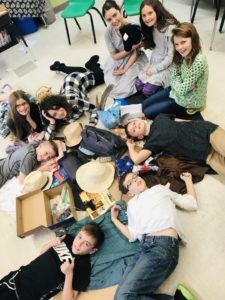
Our class is working of a very special project!
• Identify and explain the characteristics of historical fiction.
• Identify key ideas and details about ancient societies.
• Take notes, summarize, restate, and paraphrase the key ideas of the text.
• Integrate knowledge and ideas and make text-to-text connections.
• Analyze the craft and structure of a text: determine the author’s point of view and analyze the word choice.
• Express ideas applying vocabulary with precision and accuracy at an academic level.
• Discuss the development of the plot and characters throughout the story.
• Vocabulary and word studies: building academic vocabulary, roots of words.
• Accurately identify demonstrative pronouns and adjectives.
• Spelling : Words with ga, go, gu, gue, gui, gue, gui
• Identify the elements of a play.
Ciencias
As we continue to work on our on-going model ecosystem project, students inquire into where food energy comes from. They learned the conditions under which plants add biomass. We also revisited the concept of photosynthesis as the process that produces new energy-rich biomass called food. Students learned a convention, trophic levels, for describing the movement of food energy from organism to organism in a food web. They created food webs and learned about the efficiency of transfer across trophic levels (10% rule).
Mathematics
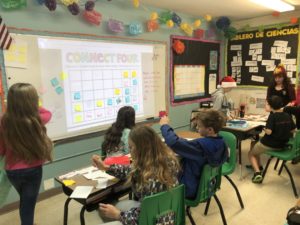
This week we finished our chapter on ratios and began working with rates. Our objectives were:
- solve unit rate problems including unit pricing and constant speed
- review ratios by playing Review Connect Four
- demonstrate understanding of ratios on the chapter test
History & Geography
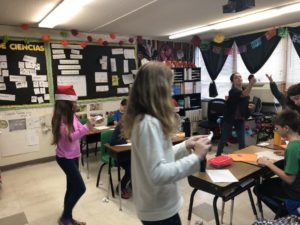 This week we completed our unit on Ancient Greece and Rome. Our objectives were:
This week we completed our unit on Ancient Greece and Rome. Our objectives were:
- Describe the rise of Christianity in the Roman Empire between 1 CE and 200 CE.
- Recognize the Germanic tribes, the rise of Islam, and the role of Christians at the end of the
empire.
- Understand how Greek and Roman contributions have had lasting effects in our culture.
- Review important events and people from the unit by playing Snowball Review
- Demonstrate critical thinking and understanding of the topic on the Unit Test
English Writing & Spelling
Our Greek and Latin words this week were:
- fort: strong
- frac, frag: to break
- gen: birth, origin
- geo, terr: earth
Students are also finishing up writing their first narrative piece of the year. They have worked very hard for many weeks on this piece. Their writing will be on the bulletin board next week so make sure to take a look!
Specialists
Art with Ms. Kelly
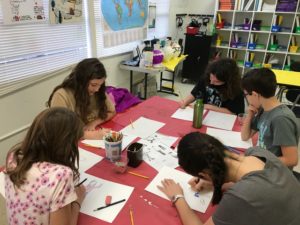 Figure Studies
Figure Studies
Each year I like to do a Figure Study project with all the students. This is a good way for them to learn about and review the basic proportions when drawing a person. We start with cutting out basic geometrical shapes for the head, body, arms and legs, and the students make a simple standing person using a collage technique. Then they learn how to make a moving figure, such as a person running or jumping.
We started the project by looking at human figures in Art History, from early Greek and Roman sculpture, to Medieval religious art, to Renaissance paintings and statues, to Modern art. The students could observe the differences in realistic figures and more abstract ones.
We also had fun with different students modeling for the class, to see if the rest of the class could create that pose using the paper basic shapes.
After the students made a collage figure, they also used crayon rubbings to create duplicate figures, and they cut out a variety of figures to show movement and rhythm in their art. Some of these amazing figures are on the bulletin board by “los banos” at school.
Holiday Mural
The students were able to practice their figure drawing skills when they made the Ice Skaters for the Holiday Mural at school. They all did a great job showing different ice skating poses. Many of the ice skaters are already on the bulletin board, and I’ll add more as they are finished.
by Ivary & Paola | Nov 16, 2018 | In The Loop
La Lectura
This week’s essential question was: How was life like for people in ancient cultures? We enjoyed reading and discussing two historical fiction pieces. The objectives were to:
• Identify and explain the characteristics of historical fiction.
• Identify key ideas and details about ancient societies.
• As we read the stories, take notes and summarize the main ideas, ask and answer questions.
• Integrate knowledge and ideas and make text-to-text connections.
• Analyze the craft and structure of a text: make predictions and determine point of view.
• Express ourselves with fluency and expression, enunciating properly in the target language, especially when in front of an audience.
• Identify the key elements of a play.
• Vocabulary and word studies: Connotations.
• Accurately identify plural nouns and collective nouns.
• Spelling: Words with c, k, and q
Ciencias
Now that students have been studying the interactions and interdependence amongst organisms in the Yellowstone ecosystem, they will create a food web showing the transfer of energy from one organism to another. Applying their knowledge about food webs and energy transfer in a balanced system, students will construct a model ecosystems. Students will have to explain each part of the model to show how the ecosystem works.
Guiding Questions:
What is this model trying to show?
How does this model give us more information about the ecosystem than a food web does?
What types of organisms will they have at each trophic level and how will these organisms interact?
What non-living, or abiotic factors will play a role?
Mathematics
This week we continued working on Chapter 4 Ratios. Our objectives were:
- Complete real-world problems with ratios, three quantities, two ratios, and with before and after ratios
Students should complete their Chapter 4 Review over break. We will have a day to review and clarify when we return from the break before the chapter test
History & Geography
This week we continued learning about Ancient Greece and Rome. Our objectives were:
- Identify architectural features of the Pantheon in Rome.
- Describe the sweeping changes made by Caesar Augustus to the army, buildings, arts, and law.
- Describe how Augustus restored Roman pride in the empire and brought about the Pax Romana.
English Writing & Spelling
Our objectives for writing were:
- Understand and edit Punctuation in our writing
- Understand and edit Spelling in our writing
Our Greek and Latin roots this week were:
- Flec, flex: to bend
- Foli: leaf
- Form: to shape
Specialists
Character Education with Ms. Jennie In character ed, we continue to read Number the Stars and have done another Reader’s Theatre on one of the intense scenes in the book where Nazi soldiers search the home of the Johansen’s. Since we are celebrating Thanksgiving this month, our theme is Gratitude and our quote is “The best things in life are not things” and our poem is “The Harvest Moon” by Henry Wadsworth Longfellow. We illustrate each quote and glue in the poem in our composition notebooks each month so they will have a nice collection at the end of the year. In December, we will set up our Giving Tree for Share so please look for it in the hallway and consider purchasing a gift for someone in need in our community!
by Ivary & Paola | Nov 9, 2018 | In The Loop
La Lectura

Our class is working of a very special project!
Our essential question this week in literacy was: How did democracy developed? We read some expository texts that presented information about the topic. One of our main objectives was to engage and participate in a conversation, using evidence to support claims, and politely express opinions or disagreements while practicing the principles of a democratic community. Students dug deep into the text analysis, asking questions to clarify understanding, identifying key ideas and details and making relevant and meaningful connections to how these concepts have been relevant for thousands of years until today. Honoring this week’s democratic process during our elections, we discussed our rights and obligations, and the importance of civic participation. Other objectives included:
• Cite relevant evidence from the text.
• Paraphrase fragments from the text in oral and written form.
• Determine the structure of a text: Comparing and Contrasting.
• Accurately identify singular nouns and plural nouns.
• Use Latin/Greek roots to determine the meaning of unknown words.
• Spelling: understand the patterns and rules of hiatus, diphthong, and triphthong.
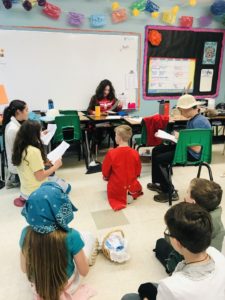
Objective: Identify the elements of a play.
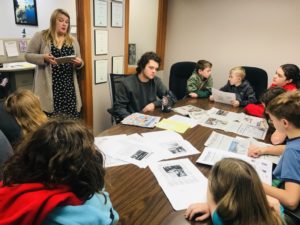
We had so much fun visiting the Post-Record Newspaper
Ciencias
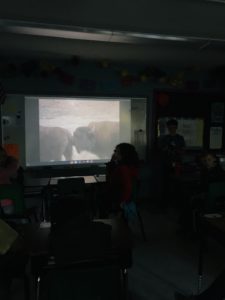
Thank you Rafa for sharing your experience at Yellowstone National Park!
As we continue with our observation and documentation of the development of our milkweed bugs habitats and terrestrial environments, we began with our studies of the interesting phenomenon of Wolves of Yellowstone. We will be reading and studying different articles showing the contrast before and after the wolves were reintroduced. In this lesson, which will span over a few weeks, students will explore and explain how species are interconnected and how energy flows from one organism to another in an ecosystem. The questions to be explored are:
How did the wolves cause a cascade of changes in Yellowstone?
What surprised you or stood out to you?
How did the biotic (living) factors change once the wolves were introduced?
How did the abiotic (nonliving) factors (such as streams, rivers, ponds, etc.) change once the wolves were introduced?
Mathematics
This week we continued working on Chapter 4 Ratios.
Our objectives were:
- Write ratios to compare two quantities
- Interpret ratios given in fraction form
- Use a ratio to find what fraction one quantity is of another or how many times as great one is as the other
- Write equivalent ratios and ratios in simplest form
History & Geography
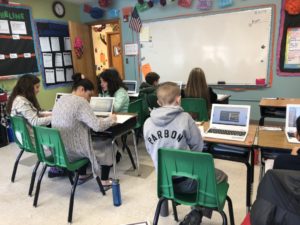
Working in Google Classroom!
This week we continued learning about Ancient Greece and Rome. Our objectives were:
- Describe Julius Caesar’s rise to power, his conquests during the Gallic Wars, and his alliance with Pompey and Crassus
- Summarize the events of each of the three Punic Wars
- Identify Hannibal and Scipio Africanus
English Writing & Spelling
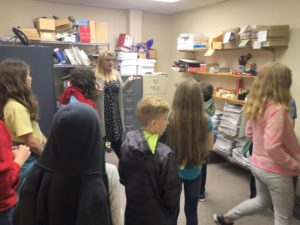
We had so much fun visiting the Camas Post-Record!
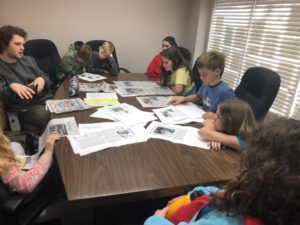 Our objectives for writing were:
Our objectives for writing were:
- finish revising our writing using DARE
- Understand how and when to Exchange parts of our writing exchanging our conclusions for Jammin’ Conclusions
- Being using CUPS to edit
- Understand and edit Capitals in our writing
- Understand and edit Usage in our writing
Our Greek and Latin roots this week were:
- Equ- equal, even, level
- Fall, fals- deceive, lie, wrong
- Fen- to strike
by Ivary & Paola | Nov 2, 2018 | In The Loop
La Lectura
We had the pleasure of having students do their end on the unit presentations on Monday. We were so impressed and proud of their accomplished pieces. Once again, they did it!.
Our class spent the rest of the week working on another very fun project. You will hear more details about it very soon! Other objectives this week included:
• Cite relevant evidence from the text.
• Paraphrase fragments from the text in oral and written form.
• Determine the structure of a text: problem and solution.
• Ask and answer questions that help clarify understanding of the text.
• Accurately identify nouns
• Identify irregular plurals
• Identify the elements of a play.
Ciencias
This week we continued with our observation and documentation of the development of our milkweed bugs habitats and terrestrial environments. We read a very interesting piece, Biosfera 2, that illustrated some of the concepts seen in class. We finished watching the video of Jane Goodall’s remarkable experience developing her field studies on chimpanzees.
Mathematics
This week we completed Chapter 3 Multiplying and Dividing Fractions and Decimals and began our new Chapter 4 Ratios. Our objectives were:
- Study for the Chapter 3 test by completing the chapter review
- Demonstrate knowledge on the chapter 3 test
- Complete the Prior Knowledge Quiz on ratios and review past skills to prepare for chapter 4
History & Geography
This week we continued learning about Ancient Greece and Rome. Our objectives were:
- Discuss Raphael’s Fresco The School of Athens
- Summarize the accomplishments and victories of Alexander the Great
- Explain the significance of the Hellenistic Period and the library at Alexandria
English Writing & Spelling
Our objectives for writing were:
- Continue revising our writing using DARE
- Understand how and when to Exchange parts of our writing exchanging Trash Can Words for Million Dollar Words
Our Greek and Latin roots this week were:
- dur – hard
- Dyna- power
- Dys- badly, ill
by Ivary & Paola | Oct 26, 2018 | In The Loop
La Lectura
As our literacy unit, Cambios, is coming to an end, we spend the week going back and reviewing/assessing the main objectives seen this unit (please refer back to previous newsletter for specific objectives). We also spent our week reflecting on our growth, discussing our favorite moments and topics covered, and developing our individual end of the unit projects. Students were asked to select an area of interest and work on a mini-research project to contribute to our class. Presentations will be held on Monday ,October 29th at 12:45. Families are welcome to attend!
Ciencias
This week, students constructed terrestrial ecosystems in the classroom. They made predictions of how the organisms will interact. They will observe them over time to understand their behavior in this controlled environment, and see if their prediction were accurate. They are using a group scientific log to observe, describe, and monitor changes in biotic and abiotic factors.
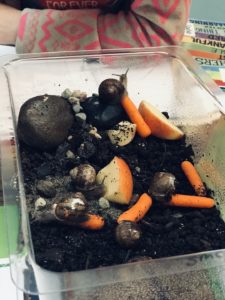
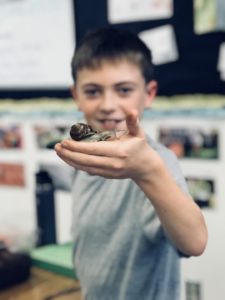
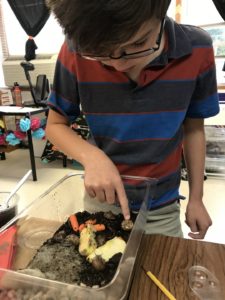
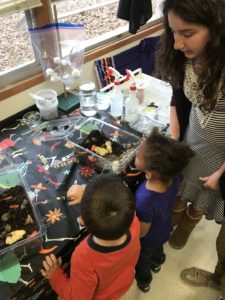
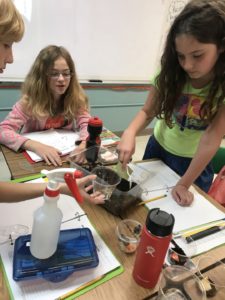
Mathematics
This week we continued working on Chapter 3 Multiplying and Dividing Fractions and Decimals. Our objectives were:
- Solve real-world problems involving fractions and decimals
- Divide a whole number or a decimal by a decimal
History & Geography
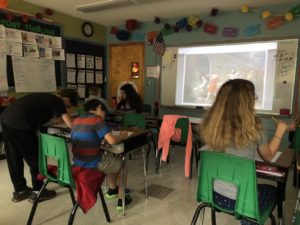 This week we continued learning about Ancient Greece and Rome. Our objectives were:
This week we continued learning about Ancient Greece and Rome. Our objectives were:
- Recognize mythology and early Greek philosophy as ways of explaining natural phenomena
- Explain the beliefs of Socrates and his role in Athenian society, his use of dialogue (the Socratic method), and his trial
- Recognize the painting The Death of Socrates by Jacques-Louis David
English Writing & Spelling
Our objectives for writing were:
- Begin revising our writing using DARE
- Understand how and when to Delete part of our writing
- Understand how and when to Add parts to our writing
- Understand how and when to Rearrange parts of our writing
- Understand how and when to Exchange parts of our writing (rocking beginnings)
Our Greek and Latin roots this week were:
- Dict- to say or speak
- doc – to teach
- Cycle- circle
- Dem, pop- people
Specialists
Art with Ms. Kelly
 The fifth and sixth graders have been working all month on a paper mâché vase made with balloons, paper cups, newsprint, etc. The vases are looking very creative and sculptural, and the students still need to finish up the painting part. Hopefully we can finish this project on Halloween!
The fifth and sixth graders have been working all month on a paper mâché vase made with balloons, paper cups, newsprint, etc. The vases are looking very creative and sculptural, and the students still need to finish up the painting part. Hopefully we can finish this project on Halloween!
In the meantime, the students have made some beautiful still life drawings, and also black glue paintings of pumpkins. Tamra’s mom Barbara has brought in several pumpkins from her garden, and she has been so helpful every Wednesday with the 5th/6th grade class. I’ll put some of the pumpkin paintings on the bulletin board soon.
In a couple weeks I’ll be sending home some of the students’ artwork that they’ve made so far. Instead of using portfolios this year, I decided it would be nice for the families to enjoy the artwork throughout the year. I really enjoy working with this creative class, most of whom I’ve known since they were K/1 students at SWS!
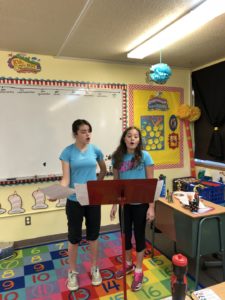 Music with Ms. Erin
Music with Ms. Erin
In October we learned about half steps, whole steps, and how to use those steps to construct major and minor triads. We learned about the marimba, xylophone, and played the glockenspiel. We also worked on composing melodies, and adding harmonies to those melodies.
In November we will learn about accompaniment, and how it is used to complement melody. We will see how accompaniment is used in various styles, and with different instruments – classical music (piano accompanist, orchestra with soloist); rock/pop (guitar, piano, or full band); and jazz (band supporting soloists). We will watch famous classical musicians such as Itzhak Perlman, Hilary Hahn, and Olga Kern perform as soloists with orchestra, playing music by Mozart, Mendelssohn, and Rachmaninov.
We will build our own accompaniment to the melodies and harmonies we composed in October.
by Ivary & Paola | Oct 19, 2018 | In The Loop
La Lectura
Congratulations to all our students for successfully completing another book club! So much learning accomplished, so many more memories made. Esperanza renace!
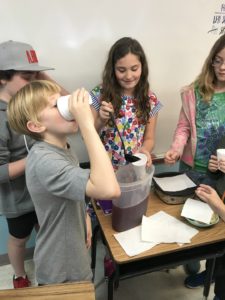
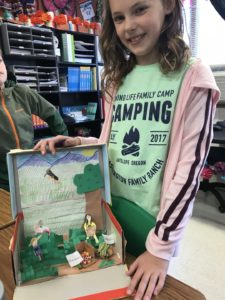
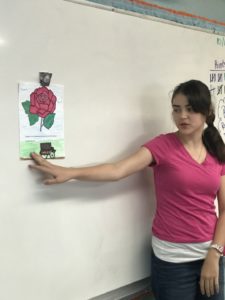
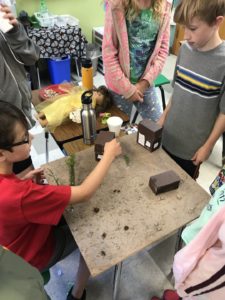
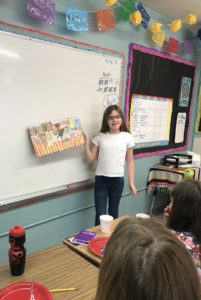
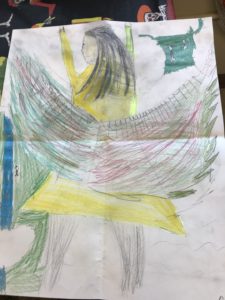
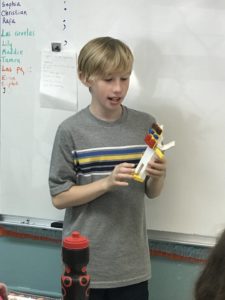
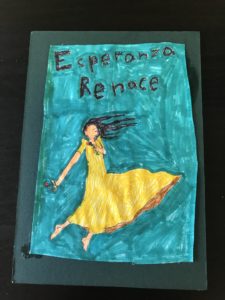
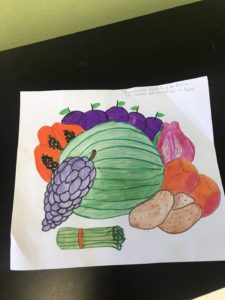
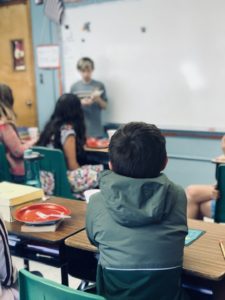
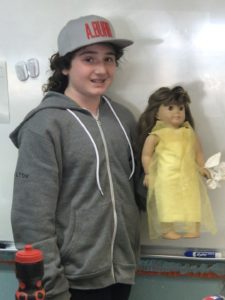
Every week in literacy, we introduce some essential questions. Based on their personal experiences and in a collaborative manner, students start generating possible answers. We provide students with many opportunities for dialogue and dialectic (oral language development). This week the essential question were: What are some of the characteristics that make humans different form the rest of the species? What is money and why is it used? What factors influence how people use money? We analyzed the quote “Money can’t buy happiness”.
Other objectives this week included:
• Identify key characteristics of expository texts and different sources of media.
• Define the theme or main idea of a text and how these are transmitted through certain specific details.
• Define the point of view or the purpose of the author of a text, and explain how these authors manifest themselves in the text.
• Follow and evaluate the argument of a text and its specific assertions. Distinguish those statements that are based on reasons and evidence, those that do not.
• Correctly use the written accent according to the tonic accent in words at the grade level applying a systematic analysis (compound words).
• Identify main and juxtaposed sentences.
Students took home a rubric that explains the end of the unit project that will be done in class next week. Please have your child explain it to you. If you have any questions, please do not hesitate in contacting me! Oh, and don’t forget to study for our mini-grammar quizzes every Monday!
Ciencias
This week students read science materials to better understand the concepts of community, ecosystem and environment. Students sorted organism pictures into two sets, based on the kind of physical environment in which the organisms might live, aquatic or terrestrial. They started to assemble an aquarium and a terrarium in preparation for introducing organisms next week.
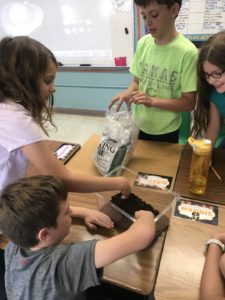
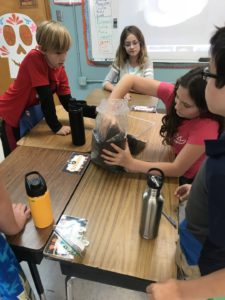
Mathematics
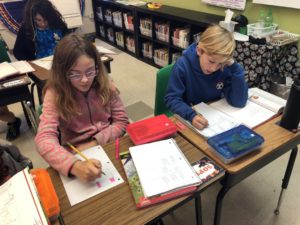 This week we continued working on Chapter 3 Multiplying and Dividing Fractions and Decimals. Our objectives were:
This week we continued working on Chapter 3 Multiplying and Dividing Fractions and Decimals. Our objectives were:
- Multiply a decimal by a decimal
- Divide a fraction, whole number, or mixed number by a fraction or a mixed number
History & Geography
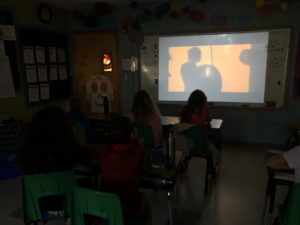 This week we continued learning about Ancient Greece and Rome. Our objectives were:
This week we continued learning about Ancient Greece and Rome. Our objectives were:
- Understand the achievements of Sparta and Athens during the wars
- Describe the persian Wars and the battles of Sardis, marathon, Thermopylae, and Salamis
- Recognize the successes of Pericles, including the formation of the Delian league and the rebuilding of the Acropolis, including the Parthenon
- Describe the architecture of the Parthenon
- Identify contributions that Aristophanes, Aeschylus, Sophocles, Euripides, Herodotus, Thucydides, and Hippocrates made to Greek culture
English Writing & Spelling
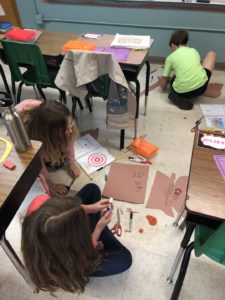 Our objectives for writing were:
Our objectives for writing were:
- Understand how to use dialogue effectively to advance the plot of a narrative writing piece
- Write a topic sentence for our conclusion paragraph of our narrative
- Write our rough draft
Our Greek and Latin roots this week were:
- Cor- heart
- Cred, cert- believe, sure, trust
- Create a bulletin board with all the Greek and Latin Roots we have learned so far
by Ivary & Paola | Oct 12, 2018 | In The Loop
La Lectura
This week in literacy, our conceptual theme was: Living in a Dynamic Planet. In connection to science, the focus question was : How do natural forces influence and affect the Earth? We read the piece El monstruo de la montana, and discussed the different non-fiction/ expository features. We also discussed how authors use different literary devices to make writing more appealing to the reader (figurative language).
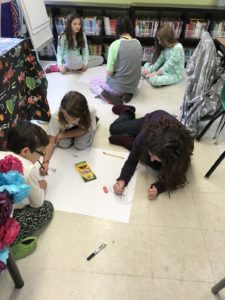 Other objectives this week included:
Other objectives this week included:
• Identify key characteristics of expository texts and different sources of media.
• Define the theme or main idea of a text and how these are transmitted through certain specific details.
• Summarize the text without giving opinions or personal judgments.
• Cite relevant evidence from the text to explain thinking, both in oral and written form.
• Demonstrate understanding of figurative language, of the relationships between words and nuances in the meaning of words.
• Interpret the figures of language (for example: personification, metaphors and other tropes) in context.
• Correctly use the written accent according to the tonic accent in words at the grade level applying a systematic analysis (Enclitic Pronouns)
• Read grade level poetry and prose orally with accuracy, appropriate rhythm and expression in progressive readings.
• Identify main and subordinate clauses.
We had so much fun getting together for our literature studies, Esperanza renace. Sadly, our book club will be coming to an end next week. We will have our last discussion on Tuesday, October 16th, where students are expected to share their final book art projects.
**Reminder** Due to not having classes on Friday, please remind your children they will be having their spelling and grammar quiz on Monday. Thank you!
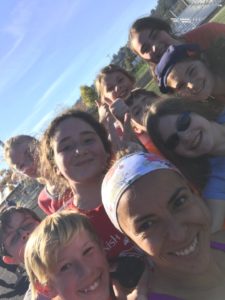
We had so much fun during our Pumpkin Run!
Ciencias
• Observe milkweed bugs. Monitor changes that yield information about their life cycle and reproduction.
• Analyze and sort images on cards to determine which represent individuals, populations, communities, and ecosystems.
• Identify biotic and abiotic elements in an ecosystem.
• Accurately apply scientific terminology and vocabulary in oral and written form.
Mathematics
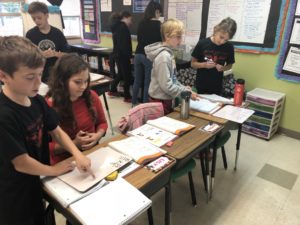
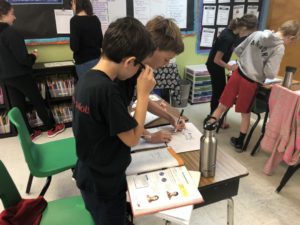 This week we began Chapter 3 Multiplying and Dividing Fractions and Decimals. Our objectives were:
This week we began Chapter 3 Multiplying and Dividing Fractions and Decimals. Our objectives were:
- demonstrate understanding of Negative Numbers and the Number Line on the chapter test
- recall prior knowledge of adding and subtracting decimals and multiplying fractions by fractions
- divide a fraction, whole number, or mixed number by a fraction or a mixed number
History & Geography
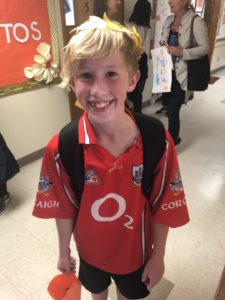
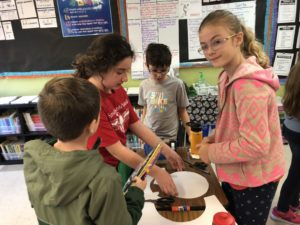 This week we continued learning about Ancient Greece and Rome. Our objectives were:
This week we continued learning about Ancient Greece and Rome. Our objectives were:
- explore excerpts from Homer’s Iliad and The Odyssey
- understand the importance of athletics and physical competition to ancient Greeks
- describe the Olympic truce, events, prizes, and legacy
English Writing & Spelling
Our objectives for writing were:
- understand how to engage and orient the read by establishing a context and introducing a narrator and characters
Our Greek and Latin roots this week were:
- clam: to cry out
- clud, clus: to shut
- cogn: to know
Our roots quiz will be on Monday October 15th.
Specialists
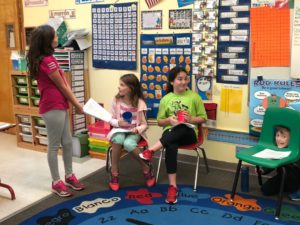
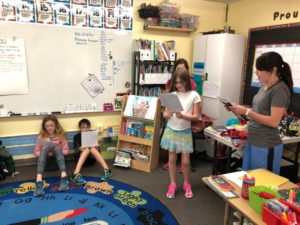 Character Education with Ms. Jennie
Character Education with Ms. Jennie
This month we are focusing on the theme of responsibility. We are talking about what this means in practical terms and of course it includes everything from helping our parents/families and doing our schoolwork to taking responsibility for our mistakes by telling the truth, apologizing, and accepting the consequences (no excuses, blame-shifting, etc.). We are continuing to read Number the Stars and have tied our theme of responsibility into our discussions about the story. Are we responsible for the safety of others? Would you feel responsible to protect a friend or even a stranger in a time of great danger or difficulty? We also did Reader’s Theatre (photos) of Chapter 1. The kids did so awesome at re-enacting this.
by Ivary & Paola | Oct 5, 2018 | In The Loop
La Lectura
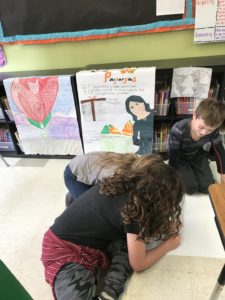
Club de lectores Esperanza renace
• Identify key characteristics of expository texts and different sources of media.
• Determine importance (main idea/supporting details) of the information presented for reading comprehension.
• Cite relevant evidence from the text to explain thinking, both in oral and written form.
• Analyze text, craft and structure of and interview.
• Integrate knowledge and ideas and make text-to-text connections.
• Correctly use the written accent according to the tonic accent in words at the grade level applying a systematic analysis. Palabras esdrujulas
• Read grade level poetry and prose orally with accuracy, appropriate rhythm and expression in progressive readings.
Students did a great job this week during our book club, Esperanza renace. Next Monday, they need to be ready to discuss: Las almendras, Las ciruelas y Las papas.
Ciencias
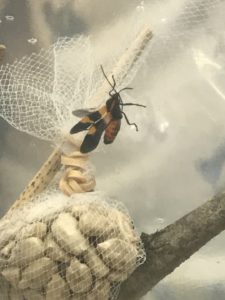 For several weeks students will observe and record events in the milkweed-bug habitats. Students should observe feeding and drinking, movement, mating, egg laying, hatching, and molting. After 8 weeks students should observe the completion of the milkweed-bug life cycle and see a multitude of offspring.
For several weeks students will observe and record events in the milkweed-bug habitats. Students should observe feeding and drinking, movement, mating, egg laying, hatching, and molting. After 8 weeks students should observe the completion of the milkweed-bug life cycle and see a multitude of offspring.
We continued the week developing answers for the following focus question: What are the defining characteristics of an individual, population, community, and ecosystem? Students used ecosystem sorting cards to reflect on organizing concepts in ecology and develop the vocabulary associated with those concepts. They were introduced to basic definitions used in ecological studies such as individual, population, community, ecosystem, and biotic/abiotic factors. They worked in groups to sort the picture cards into categories based on the definitions. Next week, we will be discussing the sorting activity and students will record their sorting results on a sheet.
• Observe milkweed bugs. Monitor changes that yield information about their life cycle and reproduction.
• Analyze and sort images on cards to determine which represent individuals, populations, communities, and ecosystems.
• Identify biotic and abiotic elements in an ecosystem.
• Accurately apply scientific terminology and vocabulary in oral and written form.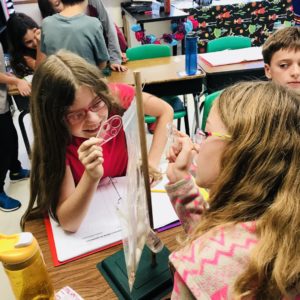
Mathematics
This week we began learning about Negative Numbers and the Number Line. Our objectives were:
- use negative numbers to represent real-world quantities
- represent, compare, and order positive and negative numbers on a number line
- understand the absolute value of a number as its distance from 0 on the number line
- interpret absolute value as magnitude for a positive or negative quantity in a real-world situation
Our test for Chapter 2 is on Monday!
History & Geography
This week we continued to learn about Ancient Greece and Rome. Our objectives were:
- understand aspects of Athenian democracy
- describe rights of citizens, women, slaves, and metics
- recognize the importance of education to Athenians
- understand the Spartan emphasis on military training, bravery, and warrior culture
- explain the Spartan system of government
- recognize some of the important differences between Athens and Sparta
English Writing & Spelling
Our objectives for writing were:
- explain the steps of the Writing Process and elements of narrative writing
- begin writing a Narrative piece by choosing a plot and theme
- continue pre-writing by understanding task, purpose, and audience
- create a graphic organizer that will guide the plot of our writing
Our Greek and Latin roots this week were:
- centr, center: middle
- chron, temp: time
- cid, cis: to cut or kill
- circ, circum: around
Our next Greek and Latin roots quiz will be on October 15th!
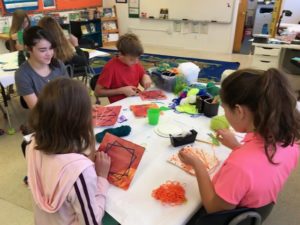 Specialists
Specialists
The 5th and 6th grade students finished their wonderful Yarn Stitchery projects which are on display on the bulletin boards at the end of the hallway. They did a great job combining painted texture with the strong linear designs of the yarn. I always wish we had more time to explore these projects further! This month the students will work on a 3 dimensional paper mâché’ Grecian Vase to go along with their social studies unit. And we’ll also learn some new techniques to create a Still Life of autumn produce from Tamra’s family garden. Many thanks to Barbara for helping out in the 5th/6th grade art class!
by Ivary & Paola | Sep 28, 2018 | In The Loop
La Lectura
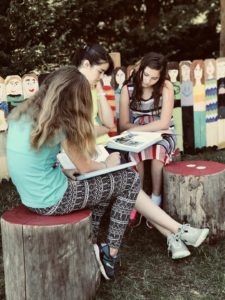
Students during shared reading.
The focus of Literacy this week was on historical fiction. We read the selection Las casi siempre verdaderas aventuras the Homer P. Figg, by Rodman Philbrick. It was such a moving story from the perspective of a 12 year old child who has to deal with very challenging life events. Students did a great job making meaningful connections and participating in the analysis of the text. Some of the objectives this week included:
- Identify key characteristics of historical fiction.
- Cite relevant evidence from the text to make contributions to our discussions.
- Accurately answer comprehension questions in written form. Share answers.
- Describe how a particular story or the plot of a text takes place in a series of episodes.
- Describe how the characters respond or change as the plot unfolds
- Analyze how a particular sentence, chapter or scene fits the overall structure in a text and how it contributes to the development of the theme, setting or plot.
- Correctly use the written accent according to the tonic accent in words at the grade level applying a systematic analysis. (Palabras graves)
- Identify subject and predicate in a sentence.
- Correctly use commas and conjunctions in a sentence or paragraph.
We were so busy this week we run out of time for our book club discussion (this usually takes place on Fridays), so we will be having this on Monday. Be ready to participate! Also, be ready for our grammar quiz!
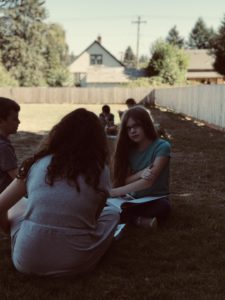
Students during shared reading.
Ciencias
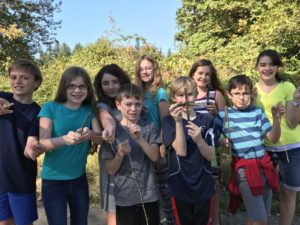
Collecting twigs for our milkweed bug habitats.
During this investigation, students raise milkweed bugs in a supportive habitat to study the insect’s reproductive biology. The information from this study is used to study milkweed-bug population dynamics in future studies. Students are introduced to adult milkweed bugs in petri dishes. Students observed the milkweed bugs carefully and discussed their notables characteristics. Students followed directions of how to create and habitat for our milkweed bugs. They will be recording their observations during the next couple weeks. .
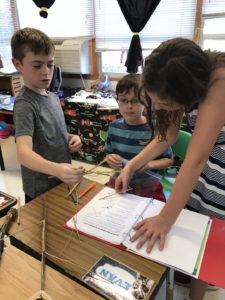
Students closely following step by step directions of “how to make a bug habitat” in Spanish!
Mathematics
This week we finished our first math chapter! Our objectives were:
- the cube of a number a is a x a x a
- the cube root of a number a is the number whose cube is a
- review concepts learned during this chapter
- demonstrate understanding on the chapter test
History & Geography
This week we complete our unit on World Deserts and began our unit on Ancient Greece and Rome. Our objectives were:
- review the information learned this chapter by playing Quiz Show
- complete the unit test
- understand the social organization of Greek City-States that share a common language and religion
- identify tyranny, aristocracy, oligarchy, and democracy as early forms of Greek government
English Writing & Spelling
Our objectives for writing were:
- understand how and when to use transition words in paragraphs
- know and use the 4 types of closing sentences at the end of paragraphs
- take the paragraph/sentence quiz
- know the 6 steps of the writing process
Our Greek and Latin Roots this week were:
- bio: life
- capit/cipit: head
- carne: meat/flesh
- ceipt/ cept/ ceit/ ceiv: to take hold/seize
Our greek and latin roots quiz is on Monday!
Specialists
Music
In September we worked on rhythm – note and rest counting, recognition, writing, and playing. We reviewed the dynamics that we learned last year, ranging from very soft (Pianissimo) to very loud (Fortissimo). We practiced working together in groups to carry a beat, and how write out rhythm patterns by ear.
In October we will delve into tonality by singing melodies, introducing harmony, and identifying major and minor chords. We will connect rhythm and melodic elements by playing the xylophone. We will also review vocal ranges Soprano, Mezzo Soprano, Alto, Tenor, Baritone, and Bass; and we will improve melodic and harmonic singing skills.
 This week we completed our unit on Ancient Greece and Rome. Our objectives were:
This week we completed our unit on Ancient Greece and Rome. Our objectives were: Figure Studies
Figure Studies














 The fifth and sixth graders have been working all month on a paper mâché vase made with balloons, paper cups, newsprint, etc. The vases are looking very creative and sculptural, and the students still need to finish up the painting part. Hopefully we can finish this project on Halloween!
The fifth and sixth graders have been working all month on a paper mâché vase made with balloons, paper cups, newsprint, etc. The vases are looking very creative and sculptural, and the students still need to finish up the painting part. Hopefully we can finish this project on Halloween! Music with Ms. Erin
Music with Ms. Erin






















 Character Education with Ms. Jennie
Character Education with Ms. Jennie


 Specialists
Specialists


